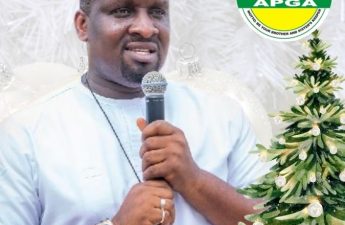The much anticipated Special Public Works programme initiated by the Buhari-led government will no longer take-off on 1st October as planned.
Reports revealed that the Ministry of Labour and Employment reached out to President Buhari for approval to extend the commencement of the programme by 19 days.
A source further stated that the ministry in charge of the process is waiting for the presidential approval.
It was learnt that delay in the release of funds for purchase of equipment for the programme led to the call for extension.
It was also reported that some locations for the implementation of the programme are flooded due to rainfall.
The programme is created to employ 774,000 young Nigerians to work on public facilities between October and December.
Each beneficiary is to be paid N20,000 per month. Fifty-two billion naira is voted for the programme in the budget.
One thousand beneficiaries are being selected from each of the 774 local government councils.
A source which spoke with The Nation said: “The funds to be used to purchase light equipment to be used was released very late, as late as last week.”
“The minister has written to the President requesting an extension. He has insisted that there must be due process in the purchase of equipment.”
“You don’t buy things across the shelf like that in government. It has to go through due process. Because the fund for the purchase of some of those light equipment came in late and we need to follow the due process, we had no choice but to ask for two weeks or 19 days extension.”
“Don’t forget that we need to go through the Bureau for Public Procurement (BPP).”
“The second reasons is that this is a dry season programme but the water level is still very high in some of the chosen sites. We expect the water level to drop. We think in the next two to three weeks it will be okay for us to start work at some of those sites. Before the end of October, they would have dried up.”
“We are looking at the end of the second week of October to officially begin implementation of the programme.”
Only 15 states have completed recruitment process and submitted the names of successful applicants.
Some of the states that have completed the selection and submitted names include: Ebonyi, Yobe, Bauchi, Zamfara, Gombe, Oyo and Benue.
The source said: “Most of the states have concluded their selection and they are submitting the lists one by one. Some that are still waiting for one or two interest groups are yet to submit and we said no problem with that since we are asking for extension.”
It was also gathered that the banks have commenced capturing the biometrics of successful applicants selected.
Six banks have been enlisted for the job. They are: Zenith, Access, Fidelity, FCMB, UBA, and Heritage bank. They have received their letters of engagement in their branches in the 774 local government councils.
The government said successful applicants will be paid through their bank accounts using their Bank Verification Numbers (BVN).
It stated that the resort to BVN would entrench transparency and avoid fraudulent payments.
Keyamo failed to speak on the commencement date of the programme but dismissed reports that the slots for federal lawmakers have been increased.
The minister said the ministry retains the original arrangement of slots allotted to political office holders and other groups.
He explained that circumstances may alter the arrangement in some states.
Keyamo said: “That is an attempt to shave my head behind me as the minister in charge of the programme.”
“I don’t know where that information came from. I am the minister in charge. I am the one on whose table the bulk stops in terms of policy matters. Who gets what in government and how is a policy matter, it is not an execution, it is policy. Once that policy is made, the agency can go and execute.”
“To set the policy as to who gets what in terms of government programme is a policy decision. It is that of Mr. President through his ministers. The agencies simply execute directives, that is how government is run.”
“The ministers are the political heads. They are the policy makers. So that (increase in slots) has not come from my desk.”
“As a general rule, we have made certain allotment to different political office holders. However, local circumstances may require alteration of the formula as we move from state to state.”



